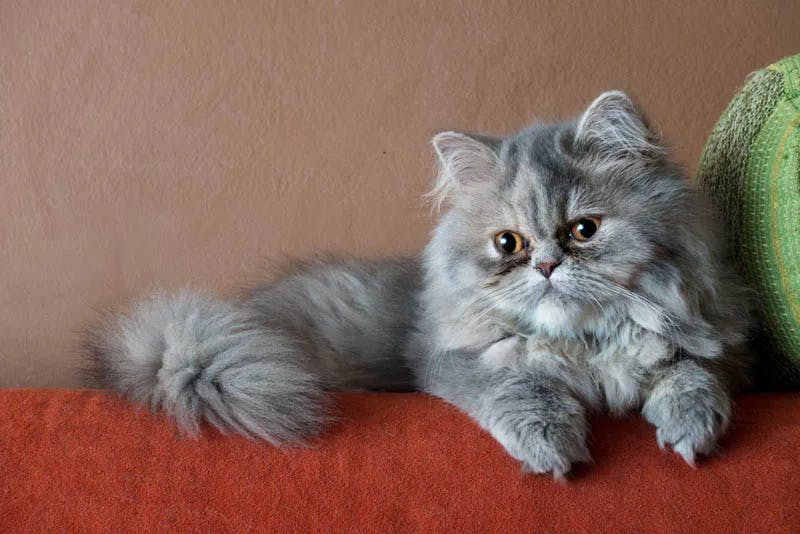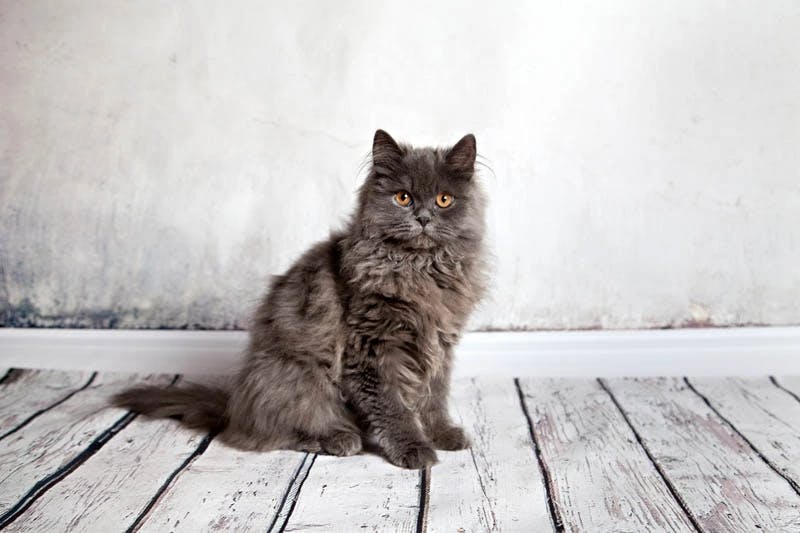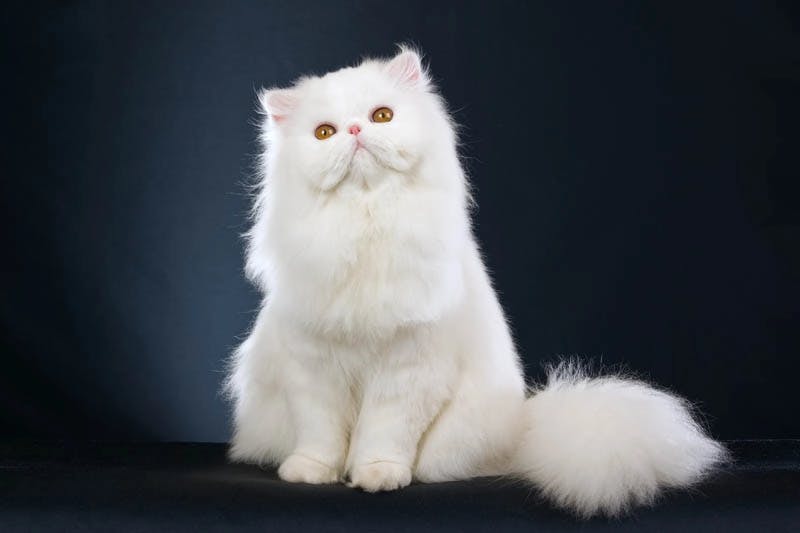Persian
The single most popular cat in the United States
Persian Cat Breed Information
Antonia Cirjak - Last updated on December 18th, 2021
Things you Should Know about Persian Cats
We are hitting the top of the popularity stakes with the Persian cat! This famously fluffy, furry, fine breed is a big hitter, and in recent decades it has become the most common cat breed in the US.
Both grand in looks and in personality, it is no wonder that the Persian has so many fanciers. With its soft coat, cutest of faces, round and rapturous eyes, and a multitude of colors, it is a striking breed. And having a calm, sweet and dignified nature, has made it a favorite of people of all ages.
The Persians' popularity has led it to become a frequently crossed breed. There are many different looks and different hair lengths in these mixes. The Himalayan cat is the most famous of these, being a cross of the Persians with the Siamese.
But let's focus on the Persian puss and what you need to know before you choose a Persian kitten for your home...

Appearance Matters. What does a Persian cat look like?
The Persian cat breed has a medium to large body with short legs. Standing tall with a massive chest and impressive distance across the shoulders, the only word to adequately describe this cat’s stature is—mighty.
A cute Persian cat typically has notably large eyes set on a broad head and a very short muzzle. A Doll Face Persian cat has a longer muzzle and nose and is considered to be the ‘’original’’, which has then been selectively bred for the appearance of a flat nose cat we know today.
Even though the showy appearance might suggest otherwise, this cat should have a healthy and strong muscle tone. The breed is known for its thick flowy coat that should bounce and gloss as the cat moves.
Should you shave your Persian cat?
Many owners opt to shave their Persians to avoid matted fur, hairballs, and tedious grooming in general.
However, do note that it is not necessary to shave long-haired cats. Both long-haired and short-haired varieties are perfectly capable of regulating their body temperature regardless of the season.
If you decide to shave your Persian to prevent the issues mentioned above, it does not mean that you should skip regular grooming and brushing. In case you absolutely cannot deal with the maintenance that comes with long-haired breeds, check out the Exotic Shorthair breed that is also called a shorthair Persian.
What colors do the Persian cats come in?
In CFA (Cat Fanciers’ Association) Standards, a wide variety of colors and patterns are permissible.
When it comes to the specific coat colors and patterns, here are the most popular ones you’ll come across when researching this cat breed:
- Blue
- Grey
- Black
- Grey and white
- Black and white
- Chinchilla
- Calico
However, since there are over 100 coat colors that these gorgeous cats can have, the Persian’s coat colors are divided into seven divisions:
- Solid Color
- Silver and Golden
- Shaded and Smoke
- Parti-Color
- Tabby
- Bi-Color
- Himalayan

It's all Personal. The Persian Cat's Temperament
Persians are very beautiful to look at and generally have a sweet disposition combined with a regal character. It’s in their Persian cat personality to tolerate almost anything and just walk away if bothered, avoiding further engagement (although, do make sure not to exploit that perk).
These beautiful cats adjust quite well to new surroundings, although some can be sensitive to loud noises. They tend to live long lives and do become very attached to their owners. Persians are usually very amiable and even doglike in their friendliness level. The Persian cat is very affectionate with people, even with strangers.
As a typical member of the feline variety, this lovely creature tends to love cuddles and long sessions full of pets and purrs. Persians are also happy, calm cats that are pleased to lay quietly with their family whenever the opportunity presents itself.
Persians are very laid-back cats that sleep a lot, and their energy level is not high. So while attached to their owners, they are usually perfectly fine left alone during the day. This is also a breed that is less keen to go out and explore the outdoors, so it will be fine napping and relaxing in your home.
Do Persian cats like to be held?
In line with their gentle nature, most Persians love to be held by their family and other trusted individuals.
Being physically close to their people is essential to these cats, so expect many cuddles from this sweet-natured cat breed. When compared to other feline breeds, Persians are one of the most affectionate.
Is it easy to train a Persian cat?
It seems that Persian cats aren’t very motivated to train and learn new behaviors. They can also be a little slower at developing than other breeds. However, that doesn’t mean that they can’t be trained, only that it isn’t so easy.
Patience is needed when teaching a Persian cat; it has even been noted that it takes them weeks to learn how to use a cat flap!
Caring for your Persian Kittens
The Persians aren’t among cats that don't shed. The breed needs regular grooming to maintain the luscious coat so make sure you are aware of this obligation before welcoming a Persian into your home for many years to come.
You should expect a lot of shedding, possibly runny eyes, and grooming issues when caring for this specific cat breed.
Do Persian cats shed a lot?
In short—yes. Persians shed substantially, and this is typically the main issue that the new owners have, mostly if they haven’t done their research beforehand.
This is a long-haired breed that will shed during the entire year, with more intense shedding periods twice a year. During these periods, Persians will get a completely new coat to keep them warm or cool, depending on the season.
Shedding is a healthy, natural process that helps minimize potential skin irritations and regulate body temperature.
Are they hypoallergenic?
No, a Persian isn’t a hypoallergenic cat breed.
Persian cats can cause allergies due to dander that can accumulate within their long coat and protein Fel d 1 originating from cat saliva. All cats produce this protein but in varying amounts. Protein and dander are the main triggers for cat allergies; however, Persians aren’t among the worst offenders, especially if you bathe them regularly.
How often should Persian cats be groomed?
Ideally, you should groom your Persian every day. Make sure to pay special attention to combing behind the ears and under the armpits with a wide-tooth comb to avoid mats.
You don’t need to and shouldn’t bathe these wonderful feline companions every day. It’s enough to do it every two to six weeks. Inspect their dense fur for dirt and decide if a bath is warranted.

The Health and Happiness of your Persian
A Persian cat’s average lifespan is about 15 years, with some individuals reaching even 20 years of age. With such a long life and a complicated genetic background, there are several possible health issues that a Persian can have.
Skin, eye, and breathing issues are common, especially in the breed’s flat-faced variety, where the head structure can cause many different problems.
Make sure you educate yourself on these issues before committing to adopt or buy a Persian cat.
Feline History. Where does the Persian come from?
Surprisingly, this stunning breed’s exact origin is still a little murky, even though the evidence for this breed was found in hieroglyphs dated 1684 BC.C.
It’s argued that Persians originated in Persia and Turkey, from where they went to Europe during the Crusades. The breed quickly attracted the European nobility’s attention and was even cherished by the Queen Victoria of England herself.
At the beginning of the 1600s, this unusually dignified flat-faced cat traveled from Persia to Europe and soon became the adoration object for many, especially those of royal descent.
In the late 1800s, the Persian cat moved once again, and this time, it was across the Atlantic to the United States. Ever since the Americans fell in love with its beautiful long silky coat and friendly disposition, it has remained the nation’s most popular cat breed.
Questions people often ask about Persian Kittens.
+Are Persian cats friendly?
+Can Persian cats be left alone?
+Is it easy to train a Persian cat?
+Where to Find the Best Persian Breeders?
